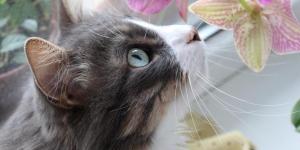Natural Scents to Stop Cat Spraying

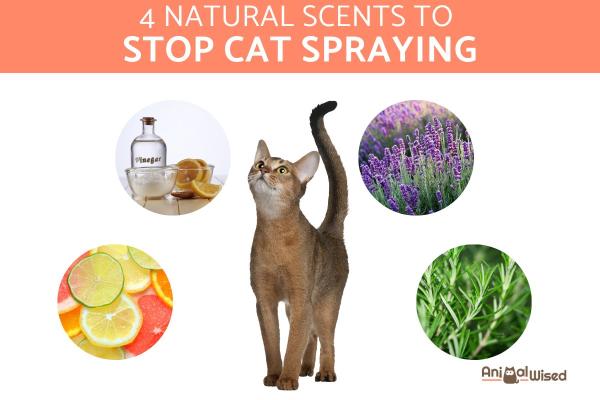

See files for Cats
Does your cat keep leaving unwelcome surprises outside the litter box? This is a common struggle for many cat owners. This behavior can be due to several reasons, including stress, medical issues, or territorial marking. While it's important to address the underlying causes, using natural deterrents can help prevent unwanted urination. One effective and humane method involves using scents that cats find repulsive.
In this AnimalWised article, we'll explore five natural scents that can discourage your cat from using the wrong spot.
Citrus
Cats and citrus fruits have a well-documented dislike for each other. A cat's sense of smell is much stronger than ours. The powerful citrus notes overwhelm their olfactory senses, creating an unpleasant experience. Not only that, but some theories suggest citrus might mimic the scent of predator markings, triggering an aversion in cats. This makes citrus a natural, readily available option for deterring your cat from unwanted peeing spots.
How to do it:
- Dry or fresh citrus peels from oranges, lemons, limes, or grapefruits can be strategically placed near problem areas. Replace them every few days as the scent fades. Cats can become accustomed to a single citrus scent over time. Switching between different citrus fruits can maintain the repellent effect.
- For targeted application, create a cat repellent spray using citrus essential oils diluted with water. In a spray bottle, mix 20-30 drops of essential oil with 1 cup of distilled water and shake well before each use.
Citrus essential oils can be irritating to cats and some surfaces. Always dilute them properly and test the spray on a small, inconspicuous area before using it around your cat.
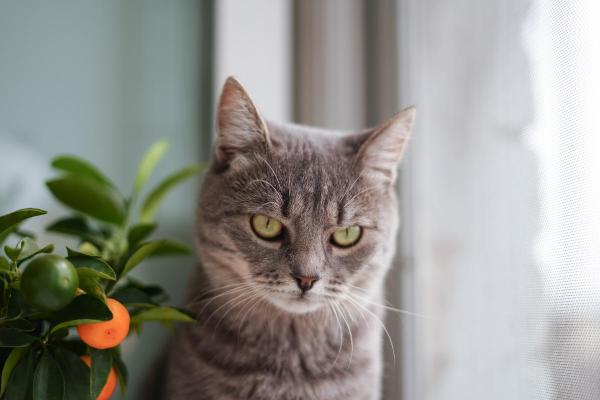
Vinegar
Vinegar is another readily available household item that can deter your cat from unwanted peeing spots. The strong, acidic scent of vinegar is highly unpleasant to a cat's sensitive nose, effectively keeping them away.
But vinegar offers a double benefit because it also acts as a natural deodorizer, neutralizing existing urine odors that might attract your cat back to the same spot. Cats rely on scent to mark their territory. The strong vinegar smell disrupts their scent markers, making the area undesirable for revisiting.
How to do it:
- Vinegar in its concentrated form can be too harsh. Mix equal parts white vinegar and water in a spray bottle to create a safe and effective solution. It is recommended to test the vinegar solution on a small, inconspicuous area of carpet or furniture to ensure it doesn't cause discoloration.
- Spray the diluted vinegar solution directly on the areas where your cat has been peeing. Be sure to wear gloves if necessary, as vinegar can irritate skin.
We've discussed deterring the spraying, but what about lingering odors? Our recommended article offers battle-tested strategies to eliminate that stubborn cat urine smell and keep your home fresh
Lavander
Lavender, often associated with relaxation and calming for humans, takes a surprising turn when it comes to felines. While we find its floral aroma delightful, cats find it overpowering and unpleasant. Some theories suggest the aversion might be linked to an evolutionary response to certain plants with insect-repellent properties.
This characteristic can be used to deter them from unwelcome peeing spots. However, a word of caution, lavender's essential oil can be toxic to cats if ingested.
How to use it:
- Place sachets filled with dried lavender strategically near areas where your cat tends to pee inappropriately. The scent will act as a deterrent without posing a risk of ingestion.
- While growing lavender plants (Lavandula angustifolia) might seem like a natural solution, supervision is crucial. Ensure your cat doesn't have access to chew on the leaves, which can also be harmful.
While deterrents can help, spraying can sometimes be a sign of a health concern. Our recommended article explores potential causes of cat spraying, including urinary issues, to ensure your feline friend is happy and healthy.
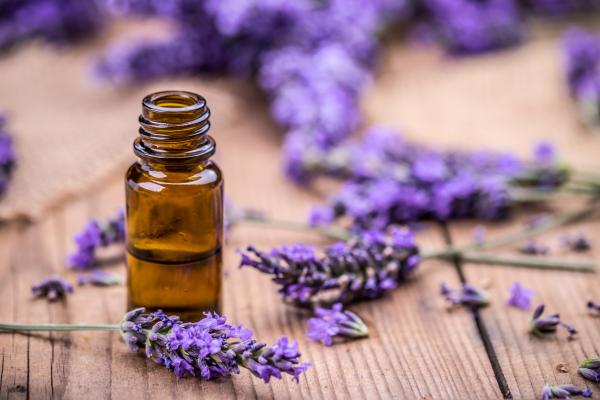
Rosemary
Rosemary, a fragrant herb commonly used in cooking, can act as a natural deterrent for cats due to its strong aroma. Cats possess a sense of smell far more acute than that of humans, making the potent, herbaceous scent of rosemary overwhelming and unpleasant for their sensitive noses.
Some theories propose that a cat's aversion to certain plants is an evolutionary response, as plants with strong scents often have insect-repellent properties, which may also be unappealing to cats.
How to use it?
- Place it strategically around the areas you want to keep cats away from. The branches will release their scent naturally.
- Fill small cloth bags with dried rosemary and place them near problem areas. This provides a sustained release of the deterrent scent.
- Highly diluted rosemary essential oil with water can be used in a spray bottle. However, there's a risk of your cat inhaling or ingesting it, which can be harmful.
The effectiveness of rosemary as a deterrent can vary depending on the individual cat. Some cats might be more sensitive to the scent than others.
Eucalyptus
The powerful aroma that humans find invigorating is highly unpleasant to a cat's sensitive nose, making it a natural deterrent. However, a critical warning, eucalyptus oil can be toxic to cats if ingested in even small amounts.
While eucalyptus can be effective, prioritizing your cat's safety is paramount. Sprays can leave a residue, and cats are naturally curious groomers. Furthermore, ingestion can lead to serious health problems.
Even if not ingested, inhaling concentrated eucalyptus oil can irritate a cat's respiratory system.
How to use it?
In theory, you could pace a few fresh or dried eucalyptus leaves out of your cat's reach near the problem area. However, this method offers limited effectiveness and still carries some risk if ingested.
This is why, given the safety concerns, it's strongly recommended to explore other safer options like the ones mentioned in this article.
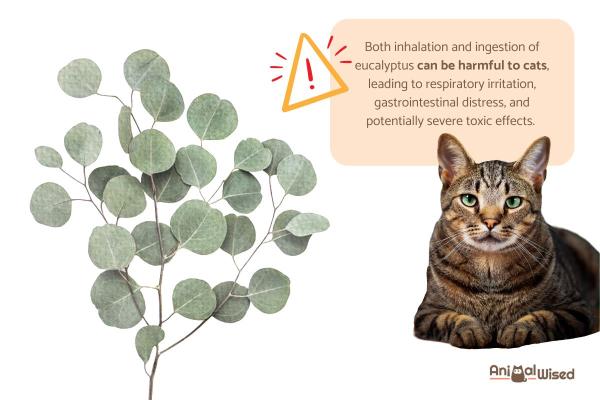
Coffee grounds
Coffee grounds can be a deterrent for unwelcome feline visitors. The smell that perks us up in the morning is quite unpleasant to a cat's sensitive nose. The coarse texture of coffee grounds can be unpleasant for cats to walk on, adding another layer of deterrence.
However, similar to other deterrents we've discussed, caution is essential. Coffee grounds can be toxic to cats if ingested in large quantities. While coffee grounds can be a deterrent, prioritize your cat's safety. Cats are curious creatures, and loose coffee grounds can be tempting to investigate and potentially ingest. Coffee grounds can stick to paws and be tracked throughout your home, potentially leading to accidental ingestion by your own cat.
How to use it?
Given the safety concerns, we recommend you explore safer options to deter unwanted cats.
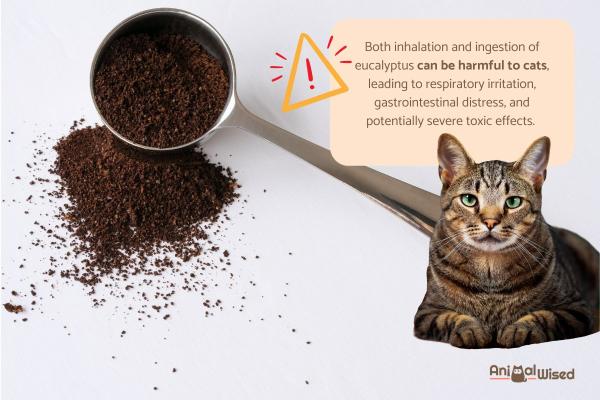
Vanilla
Continuing with the smells that we usually find pleasant but that produce great rejection in cats, now we have vanilla, which is widely used in creams, perfumes, cleaning and personal hygiene products, flavorings, candles, etc.
There are several ways you can use this ingredient to scare away cats, ranging from lighting a vanilla-scented candle or placing its essence on a stove to aromatize the environment where you do not want the kitten to enter, to scattering pieces of the pod. vanilla in your garden or in a room that the kitten should not access.
You can also use the vanilla bean to prepare a concentrated infusion and spray it on vertical surfaces where cats often mark with urine (for example, doors, bars or fences). The same procedure can be done with a vanilla essence previously diluted in a diffuser.

If you want to read similar articles to Natural Scents to Stop Cat Spraying, we recommend you visit our Facts about the animal kingdom category.




